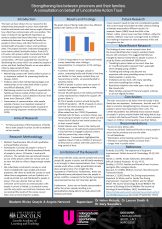By Eloise Quayle & Angela Harwood //

 Preserving family ties of people in prison continues to be an important subject matter when discussing the mental wellbeing of people in prison and the prevention of recidivism. To further add to the research within this subject area we created a survey alongside Lincolnshire Action Trust (LAT), a local charity which works with prisons in Lincolnshire to build connections between people in prison and their communities.
Preserving family ties of people in prison continues to be an important subject matter when discussing the mental wellbeing of people in prison and the prevention of recidivism. To further add to the research within this subject area we created a survey alongside Lincolnshire Action Trust (LAT), a local charity which works with prisons in Lincolnshire to build connections between people in prison and their communities.
Whilst doing our UROS project we were given the opportunity to develop a range of our skills, such as working alongside a research team, effective communication, working to a tight deadline and expand our knowledge on a range of new programmes such as Excel, SPSS and Qualtrics. We’ve found this experience especially useful as it has helped prepare us for our future within academia, we will both be entering our third year of university and will have a better understanding of how to conduct proper and thorough research proposals, investigations and programs which will help us analyse the future data we collect for our dissertations. It has also helped us feel more confident in the creation of our own new ideas that could be researched as well as working alongside others, especially those older than us. This will be very beneficial for us in the future when in employment or further study. A particular experience that was incredibly useful was going through the process of gaining ethical approval. Our supervisors were incredibly communicative and transparent with us about the stages of approval our research proposal was going through and what issues or boundaries it may have faced. This is valuable experience for us to have in the future if we wish to complete a masters or PhD as we’ll need to go through the ethical approval process ourselves then too and will now be more familiar with the process.
 However, there were some challenges faced along the way that we ultimately overcame. Unfortunately, we were not able to start analysing our data until quite late into the project as there was a delay to collecting the data results from LAT. This was necessary to ensure that we had enough data to use as analysis. Unfortunately, two of the prisons which the survey went out to was not able to collect enough data for us to analyse so our sample size was smaller. To overcome this issue, we requested a small extension and worked together to plan and assign tasks within our areas of strength to complete the project on time, maintaining frequent contact to update each other on our progress and areas of additional support. Another issue we faced was not having prior experience in using some software to input and analysis data. However, with support of our supervisors we were able to overcome this issue once we learnt how to use the programs effectively.
However, there were some challenges faced along the way that we ultimately overcame. Unfortunately, we were not able to start analysing our data until quite late into the project as there was a delay to collecting the data results from LAT. This was necessary to ensure that we had enough data to use as analysis. Unfortunately, two of the prisons which the survey went out to was not able to collect enough data for us to analyse so our sample size was smaller. To overcome this issue, we requested a small extension and worked together to plan and assign tasks within our areas of strength to complete the project on time, maintaining frequent contact to update each other on our progress and areas of additional support. Another issue we faced was not having prior experience in using some software to input and analysis data. However, with support of our supervisors we were able to overcome this issue once we learnt how to use the programs effectively.
*To view Eloise and Angela’s research poster and presentation recording, please click on the thumbnails below:
